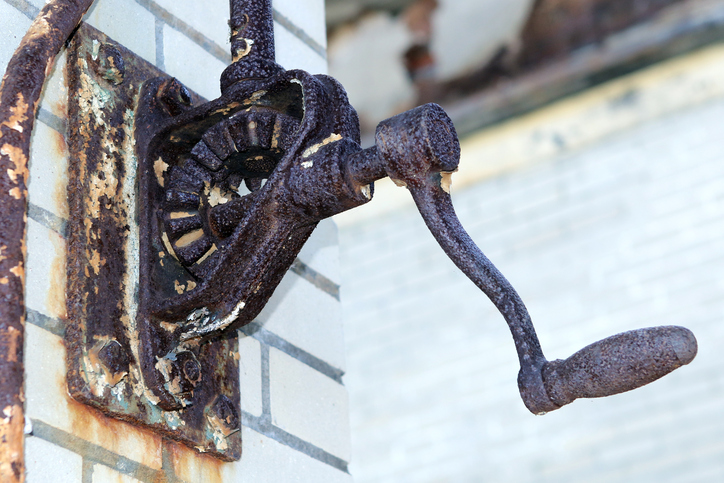crank
(noun, verb, adjective)
/kræŋk/
 LISTEN
LISTEN


A hand crank is the part of the machine that you can rotate with your hand.
Informally, a crank is a bad-tempered person or someone that supports bizarre causes or has strange ideas. A crank is also an arm or lever that makes a rotating part move in a machine. Therefore, to crank means ‘to rotate or move with a crank’ and ‘to start a machine using a crank.’ As an adjective, crank means ‘eccentric’ and also ‘done by an unbalanced person.’
Example sentences
- My husband is a bit of a crank in the mornings, but he's very sweet natured once he's woken up a bit.
- The old lady at the end of the street is always adopting stray cats and it's gotten to the point where her house is full of them; everyone thinks she's a crank.
- Very early models of cars had to be started with a crank.
- Joe cranked the car window down and asked the woman for directions.
- Linda cranked the engine until it roared into life.
- You're crazy! I don't want anything to do with any of your crank ideas!
- The journalist showed the police the crank emails he had been receiving about the articles he had written; many of them contained threats of violence.
Words often used with crank
crank up: get started or ready. Example: “Stores are cranking up for the Christmas rush.”
crank up something: stimulate or produce. Example: “The advertising agency is trying to crank up interest in the new product.”
crank something up, crank up something: turn up. Example: “It’s freezing in here; crank up the heating!”
crank something down, crank down something: decrease. Example: “The banks are cranking down interest rates.”
crank something out, crank out something: produce quickly or mechanically. Example: “John cranked out his assignment the night before it was due.”
In pop culture
A crank call (also known as a prank call) is a call made to annoy someone, either as a joke or intimidation, or because the caller is unbalanced. Example: “Police are investigating a spate of crank calls. The caller doesn’t say anything; he just breathes heavily on the phone.” (If there is a spate of something, it means that thing has been happening a lot.) In this scene from the 2004 movie Anchorman, you can see Will Ferrell’s character Ron Burgundy and his friend making obnoxious crank calls to their colleague:
Did you know?
The related adjective cranky means ‘bad-tempered,’ so you might say, “Be careful around the boss; she’s really cranky today.” In this sense we can use it to refer to anyone, but we often use it for children: “My three-year-old is always cranky when I wake her up from a nap.” It can also mean eccentric, but it is now more common to hear crank as an adjective with that meaning. This adjectival use of crank is thought likely to be a back-formation of cranky, which first appeared in US English, but is now common in other English-speaking countries too.
Other forms
crankily (adverb), crankiness (noun)
Origin
Crank, meaning ‘a handle for turning something,’ dates back to before the year 1000. Though there is no record of crank in Old English as a stand-alone noun, cranc- appears as part of the words crancstǣf (weaver’s instrument) and crencestre (a female weaver). It can be traced back to the Proto-Germanic root krank-, and is related to a different Old English word: the verb crincan (meaning ‘to bend or yield’). While the English kept the original meaning through the Middle English cranke, Krank in German and Dutch came to mean ‘weak,’ and later ‘ill.’ The sense ‘eccentric or crazy person’ first appeared in the mid-19th century. The verb comes from the noun, and was first used in the late 16th century, meaning ‘to zig-zag.’ The meaning ‘to turn a crank’ first appeared with the invention of the automobile, in the early 20th century.
Word of the Day is released Monday through Friday.



